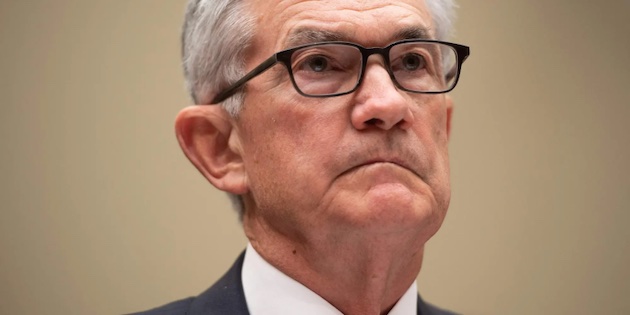Fed Chairman Jerome Powell will get a talking to over the next couple of days because he committed the crime of being honest. He was asked about Biden’s contention that the invasion of Ukraine was responsible for inflation. Powell commented that inflation began well before the invasion. Trump handed Biden an inflation rate of 12.4% on inauguration day and Biden ran that up to 7% before the invasion. Inflation has increased by just 1.6% since then.
On Monday, Biden claimed, that the Ukraine war was “the biggest single driver of inflation.” An obvious lie. And even at a 1.6% increase, not all of that was from the invasion since inflation was increasing every month under Biden before the invasion. While Powell testified before the Senate Banking Committee, he was asked by Sen Bill Hagerty:
“I realize there are a number of factors that play a role in the historic inflation that we’re experiencing: supply chain disruptions, regulations that constrain supply, we’ve got rising inflation expectations and excessive fiscal spending, But the problem hasn’t sprung out of nowhere. In January of 2021, inflation was at 1.4%. By December of 2021, it had risen to 7% — a fivefold increase. Now, since the war in Ukraine began in late February, the rate of inflation has risen incrementally another 1.6% to a current level of 8.6%. So again, from 7% to 8.6%.
“Given how inflation has escalated over the past 18 months, would you say that the war in Ukraine is the primary driver of inflation in America?”
Powell replied:
“No, inflation was high before, certainly before the war in Ukraine broke out.”
Former Treasury Secretary Larry Summers, on the other hand, believes a recession is all but guaranteed, precisely because of the Fed raising interest rates.
“Look, nothing is certain, and all economic forecasts have uncertainty,” Summers said Sunday on NBC. “My best guess is that a recession is ahead.
“I base that on the fact that we haven’t had a situation like the present with inflation above 4% and unemployment beyond 4% without a recession following within a year or two,” he explained. “And so I think the likelihood is that in order to do what’s necessary to stop inflation the Fed is going to raise interest rates enough that the economy will slip into a recession.”











